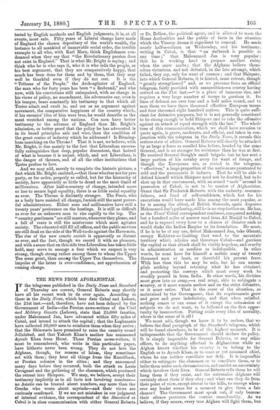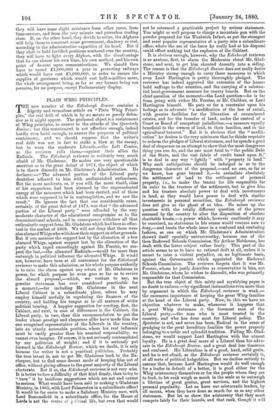THE NEWS FROM AFGHANISTAN.
Jthe telegrams published in the Daily News and Standard of Thursday are correet, General Roberts may shortly have all his recent work to do over again. According to those xi the Daily News, which bear date Cabul and Lahore, the 21st inst.—and, therefore, have not been delayed by the Government of India—the Persian news-writers of the Civil and Military Gazette (Lahore), state that 25,000 fanatics, under Mahommed Jan, have advanced within fifty miles of Cabul, and intend to attack the capital ; that the Lughmanis have collected 20,000 men to reinforce them when they arrive ; that the Shinwaris have promised to raise the country round Jellalabad, and that Yakciob Khan's mother has summoned Ayoub Khan from Herat. These Persian news-writers, it must be remembered, who write in this particular paper, have hitherto never been wrong. They do not love the Afghans, though, for reasons of Islam, they sometimes act with them ; they hear all things from the Kuzzilbash, or Persian colonies in the cities ; and they announced many days before they occurred, both the attack on Louis Cavagnari and the gathering of the clansmen, which produced the retreat into Shirpore. We may, we believe, accept their testimony implicitly as to all facts not involving numbers— no Asiatic can be trusted about numbers, any more than the Greeks who wrote about myriads—and their views are curiously confirmed. If we are not mistaken in our judgment of internal evidence, the correspondent of the Standard at Cabal is in close communication with either General Roberts or Dr. Bellew, the political agent, and is allowed to warn the Home Authorities and the public of facts in the situation which the Viceroy deems it expedient to conceal. He sends nearly half-a-column on Wednesday, and his testimony, writing in Cabal, is that " an outbreak is possible at any time ;" that Mahommed Jan is very popular ; that he is working hard to prepare another rising when the snow melts ; that the Afghans believe them- selves victorious, and not defeated, in the late attempt, which failed, they say, only for want of cannon ; and that Shirpore, into which General Roberts, it is hinted, must retreat, though "greatly strengthened" and, as we presume from an official telegram, fairly provided with ammunition—a convoy having arrived on the 21st inst.—." is a place of immense size, and requires a very large number of troops to garrison it. Its lines of defence are over four and a half miles round, and to man them we have three thousand effective European troops and four thousand eight hundred natives. This is quite suffi- cient for defensive purposes, but it is not generally considered to be strong enough to hold Shirporo and to take the offensive against an attack of equal strength with the last." The whole tone of this communication, which we shall have occasion to quote again, is grave, moderate, and official, and taken in con- junction with the telegram in the Daily News, it reveals this serious state of affairs. General Roberts will shortly be attacked by as large a force as assailed him before, headed by the same General, and is no stronger for resistance than he was at first.
He received General Gough's small brigade, but he has sent a large portion of his cavalry away for want of forage, and though the Europeans are, as stated in the telegram, " effectives," a large proportion of the natives are prostrated by cold and the pneumonia it induces. That he will be able to defend himself within Shirpore need not be doubted, but to be shut up in that cantonment, with an armed " mob " around in possession of Cabul, is not to be master of Afghanistan. Grant that Sir Frederick Roberts, with the audacity, resource- fulness, and fund of self-confidence, which but for his executions would have made him among the most popular, as he is among the ablest, of British Generals, again disperses Mahommed Jan's gathering, still he is no step further on. He has, as the Times' Cabal correspondent confesses, conquered nothing but a hundred miles of narrow road from Ali Musjid to Cabul, and he is exposed every hour to a chance of disaster such as would shake the Indian Empire to its foundation. He must, if he is to be of any use, defeat Mahommed Jan, take Ghuzni, occupy Kohistan — limiting that word to the mountain territory which adjoins and threatens Cabal—and garrison the capital so that attack shall be visibly hopeless, and cruelty in administration as needless as indefensible. In other words, he must have for himself a mobile army of twenty thousand men at least, or threefold his present force. With less than this he may be safe, but he can accom- plish nothing beyond retaining what he has obtained, and protecting the convoys which must every week be steadily poured in from India. In other words, his division must grow into an army,—a real army, able to subjugate a country, or it must remain useless and on the strict defensive, or it must retire. That is the curse of the situation, as maintained by the Government, that its requirements grow and grow and grow indefinitely, and that when satisfied, nothing comes or can come of it except the submission of subjects we do not want, to be followed on the first oppor- tunity by insurrection. Putting aside every idea of morality, where is the sense of it all ?
We must add, though we know it to be useless, that we believe the final paragraph of the Standard's telegram, which will be found elsewhere, to be of the highest moment. It is indispensable that the Government should declare its policy. It is simply impossible for General Roberts, or any other officer, to do anything effectual in Afghanistan while no Afghan knows whether his country is to belong to the English or to Ayoub Khan, or to some as yet unnamed chief, whom he can neither conciliate nor defy. It is impossible either to subjugate the clansmen or to conciliate them, or to bribe them under such circumstances, and amidst an uncertainty which involves their lives. General Roberts tells them he will hang them if they resist, and the nationalist Afghans will certainly shoot them if they obey ; and what can they do from their point of view, except retreat to the hills, to emerge when- ever any leader seems for a moment to give them a fair chance? The Government must speak out, if only because their silence protracts the contest unendurably. As we believe, if they annex, every true Afghan will fight them, but they will have some slight assistance from other races, from time-servers, and from the very minute and powerless trading class. If, on the other hand, they decide to retire, the Afghans will help them to construct some government, shadowy or real, according to the administrative capacities of its head. But if they elect to hold fortified positions scattered over the country, they will have to fight every Afghan, with the disadvantage that he can choose his own time, his own method, and his own point of descent upon communications. We should then have to spend £1,000,000 a year in protecting railways which would have cost £5,000,000, in order to ensure the supplies of garrisons which would cost half-a-million more, the whole arrangement being, so far as any human being can perceive, for no purpose, except Parliamentary display.



































 Previous page
Previous page